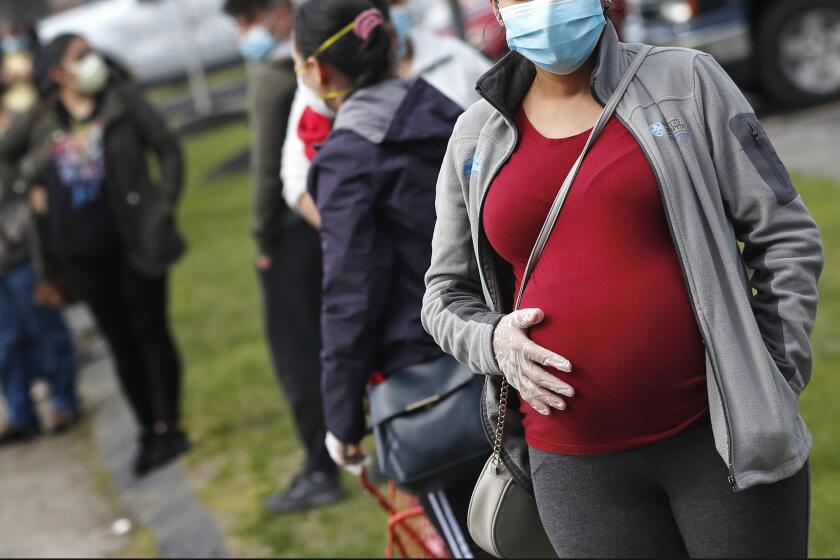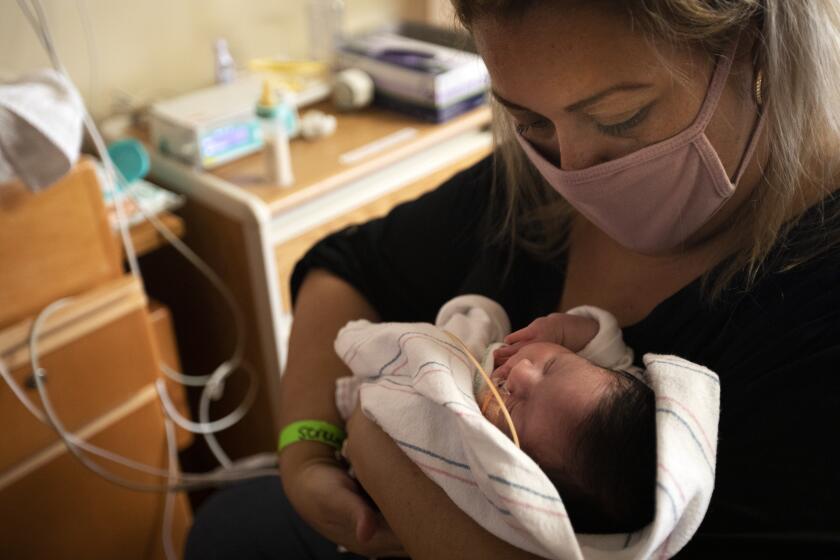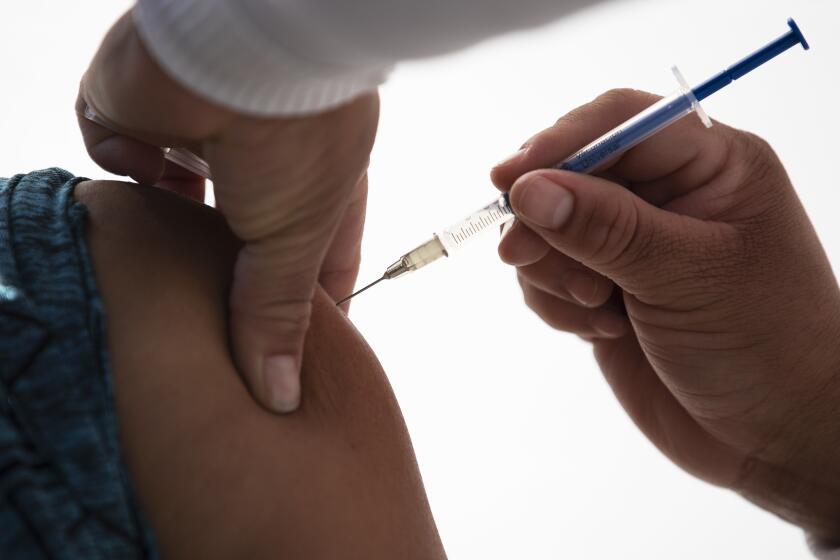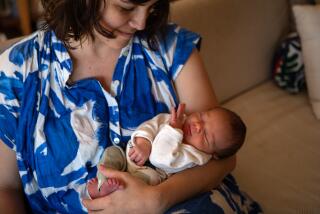Pregnancy increases risk of COVID-19 complications for women and their babies
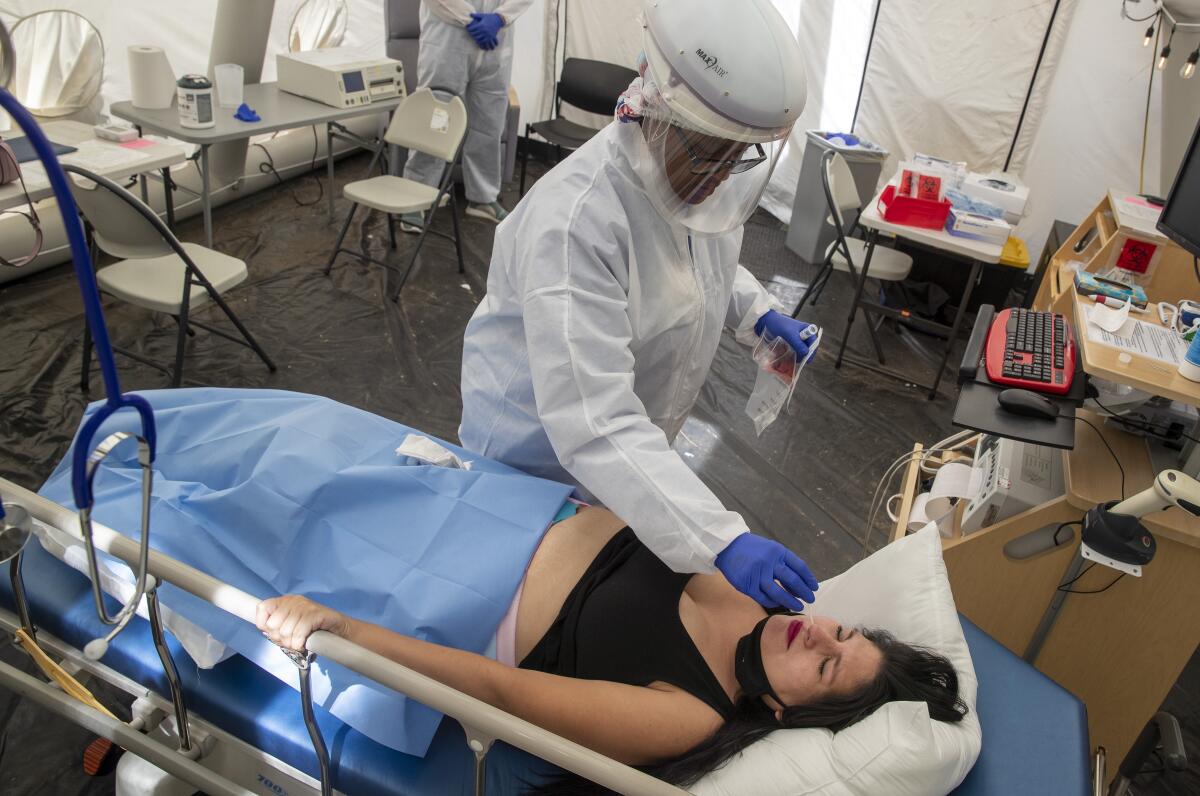
A study of more than 2,000 pregnant women from dozens of hospitals around the world has found that those with COVID-19 saw a significantly higher risk of death and of complications for themselves or their newborns.
The study, published Thursday in JAMA Pediatrics, underscores that pregnancy is a major risk factor for complications involving COVID-19 — one that should be considered alongside the likes of obesity and asthma — and could help persuade more women to line up for vaccinations.
The new report adds to a growing body of evidence “that will hopefully tip the scales towards more people getting vaccinated,” said Dr. Ilina Pluym, a maternal-fetal medicine specialist at UCLA who was not involved in the research.
The COVID-19 pandemic has put an additional burden on pregnant women: In addition to worrying about how they’d be affected by a coronavirus infection, they’re also anxious about the health of their babies.
This was particularly true at the beginning of the pandemic, when the uncertain extent of the risks “was affecting pregnant individuals’ mental health,” the study authors wrote. That’s in large part because there wasn’t much research available at the time comparing the outcomes for pregnant women with and without COVID-19.
Dr. Aris Papageorghiou, a fetal medicine specialist at Oxford University, and his colleagues were able to start tracking pregnant COVID-19 patients early in the pandemic by tapping into a network of hospitals involved in a large study tracking the health and development of normal pregnancies.
For eight months starting March 2, they enrolled women age 18 or older at any stage of pregnancy or delivery who had been diagnosed with COVID-19. Every time they enrolled a new COVID-19 patient, they immediately enrolled two pregnant women without the condition who required the same level of care. If that wasn’t possible, they enrolled pregnant women who were not diagnosed with COVID-19 and delivered immediately after the COVID-19 patient did.
They ultimately enrolled 706 pregnant COVID-19 patients and 1,424 pregnant women without the disease. The women were treated in 43 hospitals across 18 countries — Argentina, Brazil, Egypt, France, Ghana, India, Indonesia, Italy, Japan, Mexico, Nigeria, North Macedonia, Pakistan, Russia, Spain, Switzerland, the United Kingdom and the United States. Most of the women were diagnosed during their third trimester of pregnancy.
One of the largest reports on COVID-19 vaccination in pregnancy bolsters evidence that it is safe although more comprehensive research is needed
Compared with pregnant women who did not have COVID-19, those who did were 76% more likely to develop preeclampsia or eclampsia, the researchers found. They were also more than three times as likely to develop a severe infection that required treatment with antibiotics and five times as likely to be admitted to a hospital’s intensive care unit.
Strikingly, the risk of death was more than 22 times higher for the women with COVID-19.
The babies were at a disadvantage as well. The risk of preterm birth was 59% higher for mothers with COVID-19, and the risk of a medically indicated preterm birth was nearly double. Compared with babies that weren’t born to COVID-19 patients, those who were faced a 2.66 times higher risk of severe illness after they were born and a 2.14 times higher risk of severe illness and death in the time just before and after birth.
For pregnant women, “it really seems that COVID increases the likelihood of having an adverse outcome,” said Papageorghiou, the study’s senior author.
Fever and shortness of breath — common symptoms of COVID-19 — for any length of time were linked to a 2.56 times higher risk of severe complications for mother and 4.97 times higher risk of complications for baby.
For pregnant women with coronavirus infections that did not cause COVID-19 symptoms, the picture was not nearly as grim: They had a 24% higher risk of illness and a 63% higher risk of preeclampsia.
Very little is known about the impact of COVID-19 on women and the babies they carry.
Among the women with coronavirus infections, 13% of their newborns also tested positive for the virus. Women who had a cesarean delivery were more than twice as likely to have a newborn test positive. Breastfeeding, however, had no associated risk.
“This multinational study adds to that body of literature all showing increased maternal morbidity,” said Dr. Laura Riley, a maternal-fetal medicine specialist at Weill Cornell Medicine who was not involved in the study.
The findings underscore the fact that pregnancy is indeed a risk factor for severe COVID-19 and should be treated as such, Papageorghiou said.
“You really need to try and avoid getting COVID during pregnancy,” he said. He went on to list some common strategies. “You isolate more, you have your mask wearing and your space and adhere to those sort of general measures, or you avoid COVID by getting vaccinated.”
Dr. C. Mary Healy, a pediatric infectious disease specialist at Baylor College of Medicine in Houston, said the biology of pregnancy may help explain why women can find themselves vulnerable to COVID-19.
Pregnancy is linked to a host of physiological changes, including increased heart rate and oxygen consumption, decreased lung capacity and a higher risk of blood clots. And pregnancy “represents a natural state of immunosuppression,” she wrote in an editorial that accompanies the study.
There’s little data to guide women who are pregnant, or trying to become pregnant, about whether to take a COVID-19 vaccine. Here’s what to consider.
But she stressed that most pregnancies in women with COVID-19 turn out OK.
“It is important to recognize that the absolute risks of severe COVID-19 for pregnant women are low,” she wrote.
Healy also noted that the high relative death rate reported in the study was based on pregnant COVID-19 patients who were concentrated in parts of the world “where resources were less readily available, specifically resources associated with intensive care practices.”
Pluym praised the size and global scope of the study, adding that researchers should build on the findings by following the mothers and babies to track any long-term effects of COVID-19. She also said more research should be done on the effects of COVID-19 on women in the first trimester of pregnancy.
“We need to continue to study this,” she said.
